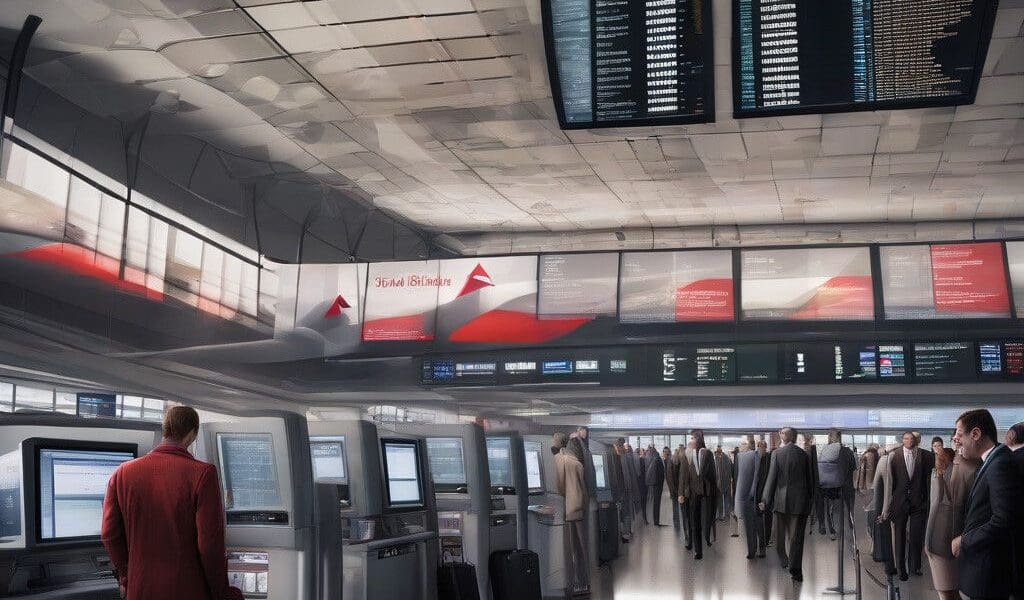Delta's Lawsuit Against CrowdStrike: The Fallout of a Flight Chaos
In a significant legal move, Delta Air Lines has filed a lawsuit against the cybersecurity company CrowdStrike in Georgia, alleging that a defective software update led to a global operational meltdown in July, affecting over 1.3 million passengers. The airline claims this incident resulted in financial losses that exceed $500 million, prompting an urgent call for accountability within the tech landscape that supports air travel.
The crisis, which unfolded over five tumultuous days, saw Delta cancel more than 7,000 flights as a result of what it describes as a catastrophic failure in CrowdStrike’s system. The software update in question reportedly triggered crashes on 8.5 million Microsoft Windows systems around the globe, crippling various sectors, including banking and healthcare. This wide-reaching impact highlights how vulnerabilities in cybersecurity and operational protocols can ripple through multiple industries, leading to drastic consequences for businesses and consumers alike.
Delta’s complaint centers on the assertion that CrowdStrike failed to conduct sufficient testing before deploying the problematic update. The airline insists that if proper precautions had been taken, the chaos could have been avoided. This critique brings to light the vital importance of rigorous software testing in today’s highly interconnected digital environment, where one vulnerable link can disrupt entire networks.
Adding layers to the case, CrowdStrike has staunchly rejected Delta’s claims, framing them as “misinformation.” The cybersecurity firm argues that Delta’s antiquated IT infrastructure could have contributed to the prolonged disruption. This counter-argument raises salient questions about the responsibilities of corporations when integrating external software solutions. Why did Delta, an airline known for investing heavily in advanced technology since implementing CrowdStrike’s products in 2022, struggle more than its peers?
The legal battle here is emblematic of the broader issues facing industries reliant on external tech solutions. As businesses increasingly depend on sophisticated software for daily operations, the stakes of ensuring software reliability and fault tolerance have never been higher. Delta seeks not only compensation for its financial losses but also damages related to lost profits, legal fees, and reputational harm sustained during this incident. Such claims underscore the potential for reputational damage to be as impactful as direct financial losses, particularly in an era where consumer confidence is fragile.
This case invites a closer examination of how organizations manage their technology dependencies. It is imperative for companies using external software providers to have robust contingency plans and a comprehensive understanding of their systems. This understanding includes preparing for the possibility that software providers may not always deliver flawless updates.
Additionally, this incident highlights the need for more stringent regulations regarding software quality assurance in critical sectors. Given the public’s heightened awareness about cybersecurity vulnerabilities, there could be growing demand for more rigorous industry standards aimed at mitigating risks associated with tech failures. Regulatory entities may need to consider frameworks or guidelines to ensure that software deployments undergo adequate scrutiny before they are released.
The fallout from this incident also serves as a cautionary tale for other companies in the sector. Organizations must continuously evaluate their operational frameworks and adapt to the inevitable technological advancements while safeguarding their operations against potential failures. Investing in not just advanced technology but also resilience planning will prove to be crucial for maintaining operational integrity in the face of similar crises.
In sum, Delta Air Lines’ lawsuit against CrowdStrike transcends individual corporate grievances; it serves as a pivotal moment for industries reliant on technological infrastructure. As litigation unfolds, stakeholders will be watching closely—not only for the outcome but for the lessons gleaned about accountability, software reliability, and the importance of maintaining a secure operational framework in an interconnected world.
Finally, as this highly publicized dispute continues, it may foster increased scrutiny and dialogue about technological dependencies in critical sectors, emphasizing that even the most sophisticated systems must be accompanied by diligent oversight and proactive management to prevent similar chaos in the future.








